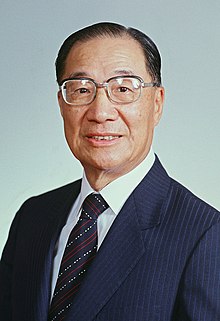Yu Kuo-hwa (Chinese: 俞國華) (January 10, 1914 – October 4, 2000) was the Premier of the Republic of China from 1984 to 1989.
Yu Kuo-hwa | |
|---|---|
俞國華 | |
 | |
| Premier of the Republic of China | |
| In office 20 May 1984 – 21 May 1989 | |
| President | Chiang Ching-kuo Lee Teng-hui |
| Vice Premier | Lin Yang-kang Lien Chan |
| Preceded by | Sun Yun-suan |
| Succeeded by | Lee Huan |
| Governor of the Central Bank of the Republic of China | |
| In office 25 June 1969 – 30 May 1984 | |
| Preceded by | Hsu Po-yuan |
| Succeeded by | Chang Chi-cheng |
| Personal details | |
| Born | 10 January 1914 Ningbo, Zhejiang, Republic of China |
| Died | 4 October 2000 (aged 86) Taipei, Taiwan |
| Political party | Kuomintang |
| Education | Tsinghua University Harvard University London School of Economics |
| Yu Kuo-hwa | |||||||
|---|---|---|---|---|---|---|---|
| Traditional Chinese | 俞國華 | ||||||
| Simplified Chinese | 俞国华 | ||||||
| |||||||
Biography
editHe was born on 10 January 1914 in Fenghua, Ningbo, Zhejiang, China. He studied for degrees at Tsinghua University, Harvard University and the London School of Economics.
He was appointed as Minister of Finance on 29 November 1967 and became Governor of the Central Bank of China in 1969.
As Premier, Yu was responsible for ending Taiwan's 38 years of martial law in 1987.[1][2] In October 1988, he walked out of a meeting of the Legislative Yuan, the first time a government official had done so, as extensive debate made it impossible for Yu to deliver his reports.[3] He died from complications from leukemia at 4pm on 4 October 2000 at the Veterans' General Hospital in Taipei.[4]
Yu was preceded by Sun Yun-suan and succeeded by Lee Huan.
See also
editReferences
edit- ^ "Taiwan Cabinet Offers a Bill To End 38-Year Martial Law". New York Times. Associated Press. 4 July 1987. Retrieved 22 November 2016.
- ^ Doerner, William R. (25 January 1988). "Taiwan The End of a Dynasty". Time. Retrieved 22 November 2016.
- ^ "Premier Takes Historic Walk". Taiwan Today. 3 November 1988. Retrieved 22 November 2016.
- ^ "Former premier Yu Kuo-hwa passes away in Taipei". Taipei Times. 5 October 2000. Retrieved 22 November 2016.